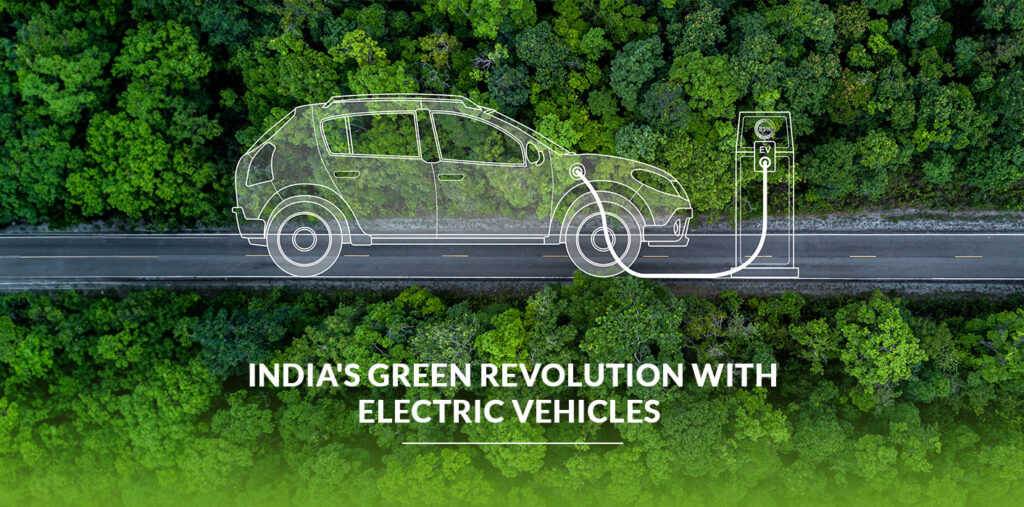In the heart of one of the world’s most vibrant and diverse nations, a silent revolution is taking place. India, renowned for its bustling streets, ancient traditions, and sprawling metropolises, is now forging a path towards a greener, more sustainable future. This transformation is being driven by the Indian government’s progressive policies promoting Electric Vehicles (EVs).
As concerns over climate change and pollution loom large, India’s commitment to clean energy and sustainable transportation is both commendable and timely. In this blog, we will delve into the current scenario of Electric Vehicles in India, explore the numerous benefits of adopting EVs, dissect the government’s pivotal role in shaping EV policies, discuss how these policies can help India lead the global EV race, and peer into the future to gauge the electric vehicle market in India by 2025.
Current Scenario of Electric Vehicles in India
India’s journey towards a greener future has taken significant strides in recent years. The Indian EV market has witnessed a surge in interest and investment, fueled by factors such as environmental awareness, rising fuel costs, and government incentives. From electric two-wheelers to electric buses, India is embracing a diverse range of EVs. Leading automakers are entering the fray, and startups are springing up, showcasing the potential of EVs in India.
Challenges remain, of course, such as the need for more charging infrastructure, range anxiety, and higher upfront costs. However, as technology advances and consumer preferences evolve, these hurdles are being gradually overcome. India’s adoption of electric vehicles is well on its way.
Benefits of Electric Vehicles
Electric vehicles (EVs) are revolutionizing the automotive industry and offer a wide range of benefits, making them an attractive choice for consumers and a sustainable solution for the environment. Let’s delve into the in-depth advantages of electric vehicles:
- Reduced Carbon Footprint: Perhaps the most prominent advantage of electric vehicles is their contribution to reducing the carbon footprint. EVs produce zero tailpipe emissions, which means they don’t release harmful pollutants like carbon monoxide and nitrogen oxides into the atmosphere. This reduction in air pollution is a significant step in the fight against climate change and improving air quality, especially in densely populated areas like India.
- Lower Operating Costs: Electric vehicles are highly efficient and use electricity as their primary energy source. This electricity is considerably cheaper than gasoline or diesel, resulting in substantial cost savings for consumers over the long term. Additionally, the cost of electricity can be further reduced by utilizing renewable energy sources, such as solar panels, for home charging.
- Innovative Technology: Electric vehicles are equipped with cutting-edge technology, offering a range of benefits such as smoother, quieter, and more connected driving experiences. Features like regenerative braking, instant torque, and smartphone integration make EVs an exciting choice for tech-savvy consumers.
- Tax and Financial Benefits: Governments often provide incentives and tax breaks for electric vehicle owners. These incentives can include lower registration fees and road taxes, making EV ownership more financially appealing.
- Environmental Impact: The availability of fossil fuels is limited, and their use contributes to environmental degradation. Petrol and diesel vehicles release toxic emissions that harm public health and the environment. On the other hand, they are significantly more efficient, converting a higher percentage of electrical energy from the grid to power the wheels, thus minimizing waste.
- Quiet and Convenient: Electric vehicles are user-friendly, with no complex gear systems. They offer a simple and convenient driving experience, where you just need to accelerate, brake, and steer. Charging an electric vehicle is also convenient, especially when using home charging stations. Additionally, the quiet operation of electric motors reduces noise pollution, making EVs a preferred choice for those looking to create quieter urban environments.
- Charging Convenience: Charging an electric vehicle at home eliminates the need to visit crowded fuel stations. You can plug in your EV at your convenience and plan your journeys in advance. Fast chargers and battery swapping services provide flexibility for on-the-road charging when necessary.
These benefits of electric vehicles extend beyond personal cost savings and convenience. They have the potential to mitigate environmental issues, reduce noise pollution, and improve energy security. As technology continues to evolve, electric vehicles are set to play a crucial role in shaping the future of transportation in India and around the world.
Government Policy for EV in India
The Indian government has taken significant steps to promote the adoption of electric vehicles (EVs) in the country through a comprehensive policy framework. These policies play a crucial role in driving the electric vehicle revolution in India and include various initiatives aimed at supporting manufacturers and consumers while also addressing infrastructure and regulatory challenges.
- FAME Scheme (Faster Adoption and Manufacturing of Hybrid and Electric Vehicles):
– Launched in April 2015, this program has been pivotal in India’s electric mobility drive. FAME provides financial incentives and subsidies to encourage both the production and adoption of EVs.
– The FAME program focuses on four key areas: creating demand for technology, piloting projects, advancing technological development, and developing charging infrastructure.
– FAME-II was introduced in April 2019 with a budget of Rs 10,000 crore to support various categories of electric vehicles, including e-three-wheelers, e-buses, e-passenger vehicles, and e-two-wheelers.
– To encourage the purchase of electric vehicles, the government has reduced Goods and Services Tax (GST) rates and offered income tax benefits.
– Lower taxes make EVs more attractive from a financial perspective.
- Research and Development:
– The government is investing in research and development to foster innovation and manufacturing in India’s EV sector.
– R&D is critical for staying competitive in the global EV market and for developing indigenous electric vehicle technology.
- PLI Scheme (Production-Linked Incentive):
– The PLI scheme aims to enhance productivity and reduce the cost of EVs, making them more affordable for consumers.
– It provides benefits to EV manufacturers and direct subsidies to buyers, benefiting the entire EV supply chain.
– To be eligible for subsidies, manufacturing plants must be operational within two years and achieve a 60% domestic value addition within five years.
– This initiative seeks to standardize battery specifications for EVs across India, making battery swapping a viable alternative to on-the-spot recharging.
– It is particularly beneficial for time-sensitive service sectors like delivery and intercity transportation.
– Standardization streamlines battery manufacturing and reduces costs.
- Duty Reduction on Electric Vehicles:
– Customs duties on critical components like nickel ore, nickel oxide, and ferro nickel have been reduced, benefiting local EV battery manufacturers.
– These materials are essential for lithium-ion batteries used in EVs, and the reduction in customs duties helps lower production costs.
– Customs duties on motor parts have also been reduced, further contributing to the cost-effectiveness of EVs.
- Special E-Mobility Zones:
– The government plans to designate specific areas where only electric vehicles or their equivalents will be permitted to operate.
– This not only encourages EV adoption but also reduces congestion and pollution in these areas.
– Similar policies are already in place in several European countries and China.
– Many states have also introduced their own EV policies to support national efforts. These initiatives include financial incentives for EV purchases, exemption from road taxes and vehicle registration costs, and low-interest rates for EV loans.
– Some states are also investing in last-mile delivery services and public transit through EV procurement and infrastructure development.
These multifaceted government policies are instrumental in driving the growth of electric vehicles in India, fostering a more sustainable and environmentally friendly future for transportation in the country.
How Indian EV Policies Will Help Win the EV Race
India’s EV policies put the nation in a promising position to excel in the global electric vehicle race. By creating a supportive ecosystem, the government is driving India toward a greener future. These policies are set to:
- Boost Adoption: Financial incentives and reduced taxation make EVs more affordable, encouraging consumers to switch to cleaner transport options.
- Economic Growth: The development of EV manufacturing and infrastructure will create jobs and stimulate economic growth.
- Sustainable Cities: Electric vehicles will play a vital role in creating cleaner and more livable urban environments.
- Energy Security: A shift toward electricity for transportation reduces dependence on imported oil, enhancing national energy security.
- Global Leadership: With forward-thinking policies, India can become a global leader in electric vehicle adoption and production.
EV Market in India by 2025
By 2025, the electric vehicle market in India is set to undergo a remarkable transformation. The Indian landscape will see a proliferation of electric two-wheelers, three-wheelers, and four-wheelers, offering a wide range of choices for consumers. The ambitious expansion of charging infrastructure across cities and highways will make owning and operating electric vehicles more convenient than ever. Moreover, India’s EV manufacturers are expected to tap into their export potential, not only meeting domestic demand but also supplying electric vehicles to global markets. As these EVs become increasingly prevalent on Indian roads, the resulting reduction in emissions will lead to improved air quality and contribute to a healthier, more sustainable urban environment. This growth aligns with India’s aggressive sustainability goals, cementing its position as a front-runner in the electric vehicle revolution and setting a precedent for a cleaner and more eco-friendly future.
Conclusion
India’s green revolution, propelled by government policies promoting electric vehicles, is a beacon of hope in an increasingly environmentally conscious world. The benefits of electric vehicles are far-reaching, spanning economic, environmental, and social spheres. The Indian government’s strategic initiatives, including incentives, infrastructure development, and research investments, are catalyzing this transformation.
As we look ahead to 2025, we see a landscape where electric vehicles will be the norm rather than the exception. The growth of the Indian EV market will not only benefit the environment but also enhance India’s energy security, economic growth, and global standing. This electric vehicle revolution will serve as a model for sustainable development, setting a path for other nations to follow. With steadfast government backing and the relentless dedication of manufacturers, India is swiftly progressing toward establishing itself as a prominent contender in the electric vehicle industry. This progress is set to make a profound impact, ushering in a more eco-friendly, pristine, and sustainable future for generations yet to come.








